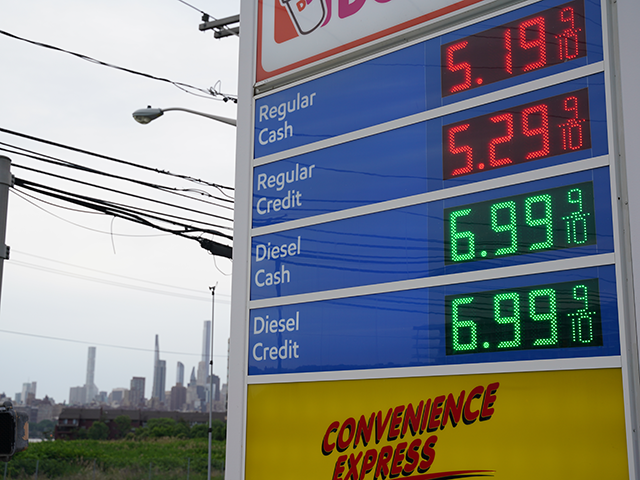Gas prices have surged to a new record high across the United States, causing sticker shock at the pump and prompting many Americans to reconsider summer travel plans.
Alongside inflation hitting a four-decade high in March and staying very close in April, the rising price of gasoline has contributed to a sense of economic anxiety and disappointment with Joe Biden’s presidency. According to Gasbuddy.com, the national average price exceeded $5 per gallon on Thursday for the first time ever. AAA has the national gas price just below that at $4.97.
Yet there are many pundits and economists saying that prices are not really so high—once you adjust for inflation. “When accounting for inflation, however, today’s prices are still about 20% below the 2008 peak on the national level and 7 percent below the California record that year,” Michael Hiltzik of the LA Times wrote in a column in March. Similar sentiments can be heard on television and social media.
Here’s an example from Kiplinger’s last week:
In nominal terms, today’s gas prices are far higher. According to travel website AAA, the current national average price of regular unleaded is $4.72 per gallon. Back in the summer of 2008, right before the financial crisis sent the economy into a deep recession, prices peaked at $4.11. So, we’ve already blown past that old record.
But if you adjust for inflation since 2008, we don’t have the highest gas prices ever – yet. According to this inflation calculator from the Bureau of Labor Statistics, $4.11 in July 2008 is equal to $5.40 in today’s dollars.
The problem is that for the purposes of evaluating whether gas prices are at a record high, adjusting for inflation in this way is not very useful. When you take one product and compare it to the broad price level, you are discovering whether the thing has risen or fallen in price more or less than everything else. So the inflation-adjusted gas price simply tells us that gas is up a lot but not quite at a record because all the other prices are also up.
This misses the point. People are not upset because they think gas prices are rising at too rapidly compared with other prices. This is not an argument about gas prices rising unfairly compared with, say, groceries. People are angry that gas prices are rising alongside all the other prices. People feel squeezed.
If you want to adjust the price of gasoline for change over time, do not use other prices or consumer price indexes. Use wages. Below is a chart that shows how many hours a worker earning the average hourly wage must work to fill an 18-gallon gas tank.

The wage-adjusted price of gas tells the real story. As you can see, it shows we really are still not at high gas prices, easily above the 2008 wage adjusted price. In fact, we’re still playing catch up to 2014.
(Correction: An earlier version of this used a chart showing hours worked rather than hourly wages, which had the effect of exaggerating the change in price of gasoline. The chart and the text have been corrected.)

COMMENTS
Please let us know if you're having issues with commenting.